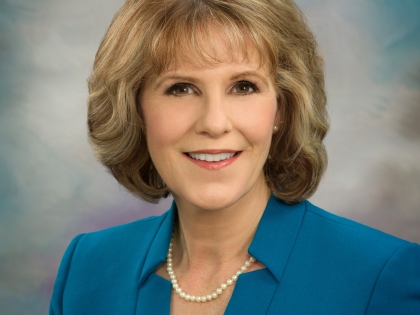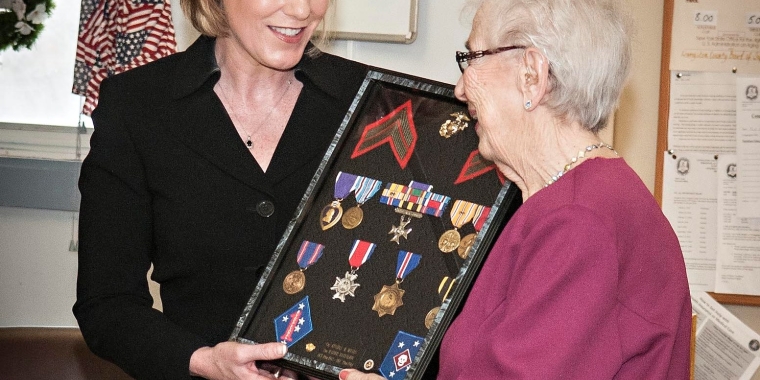
Marine Corps Veteran Russell H. Mayes Posthumously Honored for World War II Service
Catharine Young
February 20, 2014
-
ISSUE:
- Military Affairs
- Veterans

For Release: Immediate, February 20, 2014
Livingston County Veteran Honored with Awards Ten Years After His Passing
MOUNT MORRIS - In recognition of his outstanding record of military service, U.S. Marine Corps veteran Russell H. Mayes has finally received the military decorations he deserves.
During a ceremony on Tuesday, February 18, at the Mount Morris VFW Post No. 547, Senator Catharine Young (R,C,I - Olean) joined in presenting Marguerite Mayes with the military medals her late husband earned while serving overseas during World War II. With numerous family and friends present, as well as Livingston County Veterans Service Agency Director Frank Hollister, Senator Young was on hand to recognize Corporal Mayes’ honorable service and present the long overdue awards his service merits.
“Corporal Mayes’ selfless service to our country is more than deserving of our solemn remembrance and great appreciation. I am honored to be able to take part in recognizing his service, which is worthy of our highest respect and thanks. It is my hope that these important awards will demonstrate that it is never too late to make sure those who have bravely defended our freedoms and liberties are justly honored,” said Senator Young.
“I’m overwhelmed by all this. It means a lot to me,” said Corporal Mayes’ wife Marguerite as she offered her thanks for the long-overdue recognition, which comes ten years after he passed away in 2004.
Due to Corporal Mayes’ humility, however, he was reluctant to talk about his wartime experiences and never pursued the medals he earned.
“Right now I think he’s up there rolling his eyes and saying, ‘What’s all the fuss about?’ He never talked about his experiences,” said Marguerite.
A native of Meredosia, Illinois, Cpl. Russell H. Mayes enlisted in the U.S. Marine Corps Reserve on October 19, 1942, in Kansas City, Missouri, at the age of 18.
Corporal Mayes trained as a Fleet Marine Force infantryman and was assigned to the 2nd Marine Raider Battalion.
The Marine Raiders were an elite fighting force requested by Admiral Chester Nimitz, Commander of the Pacific Fleet, and created by order of President Franklin D. Roosevelt. The Raiders were special Marines, hand-picked from among volunteers, and trained in guerrilla warfare and rubber boat tactics for raids on lightly defended Japanese-held islands. Admiral Nimitz picked the name “Raider” to best symbolize their special mission. They are the predecessors of what is now called Marine Corps Force Recon and the Marine Corps Forces Special Operations Command.
Corporal Mayes and the 2nd Marine Raider Battalion, commanded by Lt. Col. Evans Carlson, arrived in the islands of New Caledonia in the southwest Pacific Ocean on October 4, 1943, where they trained and prepared for the invasion of Guadalcanal.
One month later, on November 4, 1943, Mayes was part of two companies of Lt. Col. Carlson’s 2nd Marine Raiders who landed by boat at Aola Bay and joined the U.S. Army’s 147th Infantry Regiment in providing security for 500 Seabees constructing an airfield. Due to the unsuitable terrain, however, construction was later abandoned.
On November 5, 1943, Maj. Gen. Alexander Vandegrift, Commander of the 1st Marine Division, ordered Carlson to march his Raiders overland from Aola and attack the retreating Japanese Army’s 230th Infantry Regiment that had escaped from Koli Point. Carlson and his Raiders set off on a 29-day patrol from Aola to the Lunga perimeter. Cut off from other Allied forces and behind enemy lines, they had to be resupplied by parachute drops. During what Marine Corps historians refer to as “Carlson’s Long Patrol,” the Raiders fought several battles with retreating Japanese forces, resulting in nearly 500 Japanese and 16 Raiders killed.
Corporal Mayes engaged Japanese forces in direct combat on three occasions while on Guadalcanal: in November and December 1943, from January to March 1944, and from April to June 1944.
During his tour in the Pacific, Corporal Mayes also participated in the Battle of Bougainville, also known as Operation Cherry Blossom, from December 1943 to January 1944; the seizing of Emirau Island in March 1944; the recapture of Guam in the Mariana Islands in August 1944 where he participated in an assault landing amid fierce fighting against enemy forces; and was also part of garrison forces on Emirau Island from July to August 1944. While in combat, Corporal Mayes sustained serious wounds to his eye, leading to his eventual discharge.
With two years and two months of active duty and a year spent overseas, Corporal Mayes was mustered out of the Marine Corps on December 29, 1944, at Marine Base, Naval Air Station, Moffett Federal Airfield, California.
After returning home, Corporal Mayes would later meet and marry Marguerite in 1954. Together, while living first in Hartsville and later in West Sparta, New York, they raised their daughter and three sons: Gail, James, Russell Jr., and John, before Corporal Mayes passed away in 2004 at the age of 80.
In honor of his heroic service, Senator Young presented to Marguerite Mayes from the U.S. Marine Corps the Purple Heart, the Combat Action Ribbon, the Navy Unit Commendation Medal, the American Campaign Medal, the Asiatic-Pacific Campaign Medal with Two Bronze Service Stars, the World War II Victory Medal, the Marine Corps Marksmanship Qualification Badge in the Grade of Sharpshooter, and the Marine Corps Discharge and Honorable Service Lapel Button.
In addition, from the New York State Division of Military and Naval Affairs, he received the New York State Conspicuous Service Cross and Conspicuous Service Star.
He was also honored with two private commemorative medals struck independently of the United States military in recognition of service in historic or notable campaigns he participated in or supported. These are the Special Operations Commemorative Medal and the USMC Commemorative Medal.
“Corporal Mayes’ life was a prime example of humble service. He embodies the principles of honor, courage, and commitment that define the Marine Corps. For all he did for us, we offer our most sincere gratitude and appreciation,” said Senator Young.
###
Share this Article or Press Release
Newsroom
Go to NewsroomSenate Democrats Fail Taxpayers
January 14, 2019
Senator Young Expresses Opposition to Public Campaign Financing
January 7, 2019